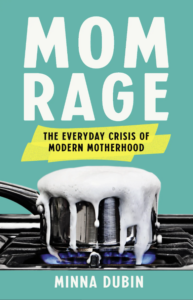
We Need a Motherf*cking Break: On Mom Rage and the Fantasy of Joint Custody
Minna Dubin Considers the Potential Upside of Divorce
Sometimes I fantasize about being divorced. I don’t want the heartbreak or the meanness, the money fights or the bitterness. Even “amicable” divorces seem painful. Honestly, I don’t even want to be divorced from Paul. I just really like the idea of parenting and being married every other week. A week on/week off custody arrangement. During Paul’s week with the kids, I’d get a break. Not a grocery-store break. Not a texting-while-pooping break. Not even an exercise-and-brunch break. But a day-after-day-of-silence respite. A weeklong reprieve from the constant need. A seven-day release from decision-making fatigue. An every-other-week vacation from preparing and navigating everyone’s food preferences and issues all day long. An all-inclusive, comprehensive, surround-sound, motherfucking break!
I felt I was having a legitimate reaction to the hard work of mothering while being unseen, unappreciated, and then undermined.
During Ollie’s toddler years, when Paul and I were fighting a lot, Ollie had become more challenging as two-year-olds are wont to do in their maniacal forward march toward personhood. His sensory-related needs were also beginning to surface. (No short sleeves! No meat, vegetables, cheese, or beans! No crowds!) I was learning to navigate Ollie’s big feelings while trying to handle my own. On top of that, my resentment toward Paul was swelling. I felt he consistently undercut my authority. I was using all my reserves to deftly and calmly parent Ollie, and Paul’s undermining felt like the final thread to my sanity. My rage zeroed in on him.
I noticed the longer I let little Ollie watch videos, the bigger his freak- out would be when I told him screen time was over. So instead of letting him watch for forty-five minutes, I learned to transition him to a new activity at twenty or thirty minutes. One Saturday afternoon, I walked into Ollie’s room and told him it was time to close the laptop. Predictably, Ollie protested loudly and with tears (a low-level freak-out). From down the hall, Paul said, “It’s only been thirty minutes. I think it’s okay if he watches a little more.” Having spotted a weakness, Ollie began to whine in earnest, “Pweeeeze!”
Unwittingly or not, Paul had wedged me into a corner. I could let Ollie continue watching and weather the toddler hurricane that would come after forty-five minutes of screen time. Or, I could be Mean Mommy and stick to my guns, enduring Ollie’s giant freak-out, while Paul winced at Ollie’s screams and shook his head at my rigidity. This sort of thing became such a trigger that the thousandth time it happened I shouted at Paul loud enough for the neighbors to hear, “NO ONE IS TALKING TO YOU!!!” Then I had to grovel for my inappropriate outburst. Instead of being unified in raising our beloved, tiny tyrant, Paul’s parenting avatar was sparring with mine, our different parenting strategies cheering and booing on opposite sides of the ring. Co-parenting was often harder than solo parenting. Weekends felt challenging to the point of dread. The eating and naptime routines I’d implemented through an exhaustive process of trial and error were golden structures that helped me survive the long weekdays when I was in charge and Paul was at work. At best, Paul saw these routines as optional. He chalked up my frustration (which often presented as rage) to my being fearful and controlling. I felt I was having a legitimate reaction to the hard work of mothering while being unseen, unappreciated, and then undermined.
This misalignment between Paul’s understanding of my rage and my own understanding of my rage is due to a slew of gender- related differences in how anger, motherhood, and fatherhood are perceived. Because dads don’t experience the identity tumult of matrescence and rarely bear the weight of primary parenthood, they don’t see or feel the stress mothers are under or the double amount of domestic labor mothers do. Dads are by-products of a culture that disapproves of women’s anger, so dads tend to blame moms who rage instead of seeing the ways our anger is warranted. The differences in fatherhood and motherhood, and the gendered perceptions of anger, add to the gulf that often forms between men and women in parenting partnerships.
Divorce as a labor reprieve for mothers came up in a few of my interviews. One mom in a same- sex marriage said, “If I were a halftime parent, I would have a lot more bandwidth to stay calm and actively manage my kids.” A single mom confirmed our yearning: “One great thing about being divorced is I get two days off a week.”
I know if I actually got divorced, I’d be bereft. Despite our parenting squabbles, Paul is my North Star. Still, it says something about the current state of Motherhood that moms who are still in love with our spouses and don’t want to get divorced are dreaming about it. It is the only way of getting a break that we can imagine.
___________________________

Excerpted from Mom Rage: The Everyday Crisis of Modern Motherhood by Minna Dubin. Copyright © 2023. Available from Seal Press, an imprint of Hachette Book Group, Inc.
Minna Dubin
Minna Dubin(she/her) is a writer and mother in the San Francisco Bay Area. Her writing has appeared in the New York Times, Salon, Parents, the Philadelphia Inquirer, Romper, The Forward, Hobart, MUTHA Magazine, and Literary Mama. She is the recipient of an artist enrichment grant from the Kentucky Foundation for Women. As a leading feminist voice on mom rage, Minna has appeared on MSNBC, Good Morning America, The Tamron Hall Show, NBC10 Boston, and NPR.



















